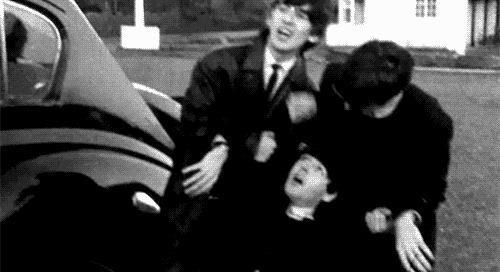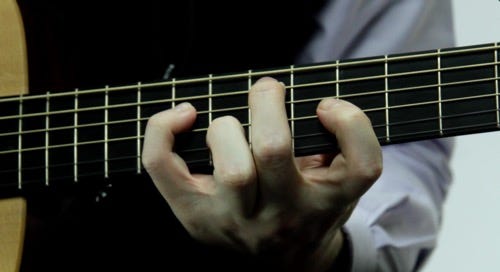
Avril Lavigne and the Future of Musical Translation
In 2007, Avril Lavigne released her hit song "Girlfriend" in 7 languages. George Ball chronicles how this might have been a harbinger for a larger trend.
Every morning when I delete the 100 assorted marketing emails that trickle into my inbox, I long for a day when I will receive none. But then an email sneaks through the pile of corporate garbage that makes it all worth it.
I just got shown the Girlfriend EP by Avril Lavigne last week. It's a compilation of 25 different versions of “Girlfriend” all sung by Ms. Lavigne. There are 4 versions in English and 21 sung by her in different languages. Only the choruses are translated, and it's absolutely bizarre.
This email — from a recent graduate named George Ball — went on to explain how Lavigne’s EP was an example of a long line of artists singing their songs in different languages. But, he claimed, the reason behind its making might also suggest a weird future rife with AI-powered singers. I’ll let George explain. As usual, you can listen to a podcast version of this newsletter on Apple, Spotify, and Substack.
Hey, Hey, You, You, Non Amo Tua Ragazza
Canadian pop-punk sensation Avril Lavigne rose to fame in 2002 with her debut album Let Go, which spawned the hit singles “Complicated”, “Sk8er Boi”, and “I’m with You”. By 2007, she had scored six top 40 singles and was on the verge of releasing her third album, The Best Damn Thing. The Best Damn Thing was also a big hit, topping the charts in seven countries on the back of its Dr. Luke-produced smash “Girlfriend”.
Until recently, I had very few thoughts about the song “Girlfriend” or Avril Lavigne in general. That changed when I discovered the strange EP that accompanied the original song.
The Girlfriend EP was put out alongside the single and includes 25 versions of the hit song. Lavigne sings clean, explicit, and remixed versions of the song in English, French, Spanish, German, Italian, Portuguese, Japanese, and Mandarin. Oddly, only the chorus of the song is translated in these versions. The rest remains in English.
Not long after the song’s release, a panel of multilingual MTV employees discussed and dissected the translated lyrics. Though they found some of the pronunciation lacking (e.g., “And there's no explanation for why she couldn't get her mouth around ‘copine’ [the French word for girlfriend].”) and pieces of the translation slightly off (e.g., “The first line in Italian, ‘Non amo tua ragazza,’ she's saying, ‘I don't love your girlfriend.’ I understand, because if you use the other verb for "like" it doesn't sound right.”), most agreed that the non-English versions captured the original intent of the song.
As you’d expect, Lavigne recorded these tracks to appeal to a wider audience, especially since she had a growing fanbase in Asia. Terry McBride, Lavigne’s manager, said more of her music was listened to in Asia alone than the rest of the western hemisphere combined. Releasing the tracks in Mandarin and Japanese was a good way to capitalize on this success.
While this may seem like nothing more than a novelty to boost interest in her new record, Lavigne’s multilingual EP raises some interesting questions about how people listen to music. Do fans want to hear songs in their local tongue? Or do they prefer the original versions even if they can’t understand the lyrics?
A Brief History of Musical Translations
In the 1950s and 1960s, it was common for European musicians to record translated versions of American hits for local audiences. Johnny Hallyday and Hugues Aufray, for example, were famous for their French covers of Elvis Presley and Bob Dylan songs, respectively.
The translation pipeline worked in the other direction too. Frank Sinatra’s “My Way”, for example, was first a French song by Claude François called “Comme D’habitude”. Paul Anka later wrote an English set of lyrics for the song. The melody in the English version remains the same.
In the early part of the 20th century, it wasn’t uncommon for artists themselves to record their own songs in different languages to reach a wider audience. That process seems to have ended around the 1960s. The Beatles, for example, recorded German versions of “She Loves You” and “I Want to Hold Your Hand” under the names “Sie Liebt Dich” and “Komm Gib Mir Diene Hand”, but they stuck exclusively to English after that point. Of course, there are examples of this after the 1960s — David Bowie, for example, recorded German and French versions of “Heroes” — but it was certainly not the norm.
Will There Be More Translated Songs in the Future?
Though artists translating their songs has become less common, recent advances in AI technology make it possible such that this trend could reemerge in a way that is cheaper and less time-consuming. In fact, Spotify recently rolled out a small program that would use AI to translate popular podcasts into a variety of languages.
This may be the future of music too. American artist Lauv is one of the first to use similar tech commercially. Last year, he released a Korean version of his song “Love U Like That” using AI to translate the song and perform the vocal. The lyrics were translated and sung by K-Pop star Kevin Woo but it sounded exactly like Lauv. “Think of it like a filter,” producer DJ Swivel told Woo as he recorded the song. “It will be exactly like you sing it, but it won’t sound like your voice anymore.” With this set up, Lauv could very easily release a version in every language.
Maybe artists don’t see the need in making music like this, though. The intricacies of language sometimes don’t translate well, and popularity shouldn’t necessarily be dictated by what language you sing in. K-pop superstars BTS, for example, were steadfast about not singing in English for the first few years of their career. They wanted to maintain their identity and not pander to international audiences. Since then, they have released several songs in English, but their original point remains.
That said, non-English songs have become more popular in the English-speaking world recently. In 2023, seven non-English-language songs reached the top 10 on the Billboard Hot 100. Maybe this is a sign that the world we live in is becoming more connected thanks to streaming services and the abundance of music easily available.
The opposite could also be the case too. Maybe increased accessibility creates sharp divisions between countries and languages. All the world’s music is now readily available for listeners. Why choose to listen to a song in a different language or by an artist from a different country when you can listen to a local, organically grown? According to research by Will Page and Chris Dalla Riva, national music charts are becoming filled with local artists in recent years.
Whatever perspective becomes reality, I am sure that there will be more linguistic variety in music in the future. Whether it’s artists using AI to translate their songs into multiple languages or TikTok driving songs to become popular in countries that don’t speak the language the lyrics are in, the world is becoming more connected. Maybe Avril Lavigne was onto something.
A New One
"CouCou Freestyle" by Chilly Gonzalez, Sheldon & M Le Maudit
2024 - Classical Rap
I have been following Chilly Gonzalez since his 2017 album with Pulp star Jarvis Cocker. Since then, the pianist has never stopped hopping genres. Last week, he put out the EP Grünt #63, a collection of freestyle rap songs featuring him playing some classical piano with a host of French musicians. I thought it was nice to include this song given that I was mostly unaware that the lyrics were not in English, my native language. The performance was just too intoxicating.
An Old One
"Helden" by David Bowie
1977 - Art Rock
Hearing David Bowie belt out “Dann sind wir Helden!” with somehow more oomph and gusto than he did the original English version of “Heroes” is really something to behold. The translated lyrics fit the cadence perfectly and the delivery of such an expressive language in a song like this works really well.
Today’s piece was by George Ball. Ball is an Economics graduate and skilled bartender from Manchester, England. He is passionate about live music, data analysis, and bowling. He’d love to find a way to combine the three in his life going forward.
Do you you want to write for this newsletter? Send pitches to cdallarivamusic [at] gmail, and I will get back to you if I’m interested.


















I understand hardly any of the lyrics to Paulo Flores' music. He is an Angolan singer and I have been listening to his extraordinary music since the mid 1990's. Angolan music is my favorite African music.
Whenever this comes up, I always think of Scorpions, Germans who for decades did all their singing in English; as contrasted with Rammstein, who revealed the impact and fitness of German to sing heavy metal in.
While I have no doubt Klaus Meine could've made something cool (tho' different) singing in German; Till Lindemann's forays into English and Spanish in the Rammstein catalog ranged from awkward to embarrassing.